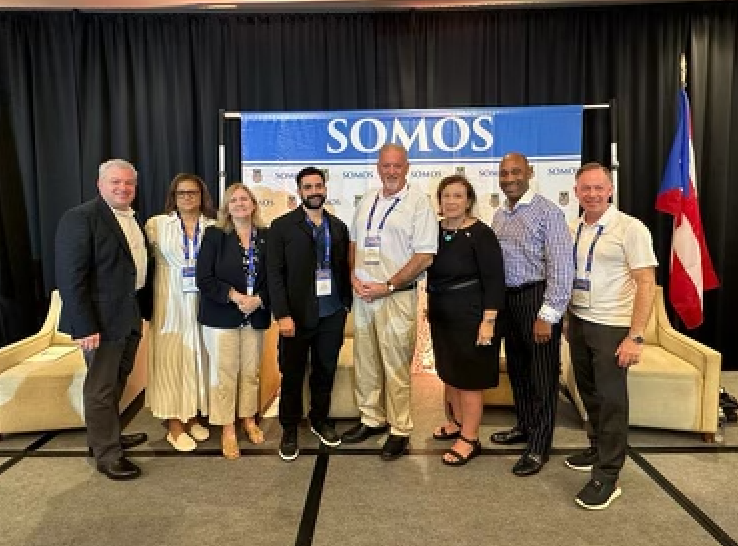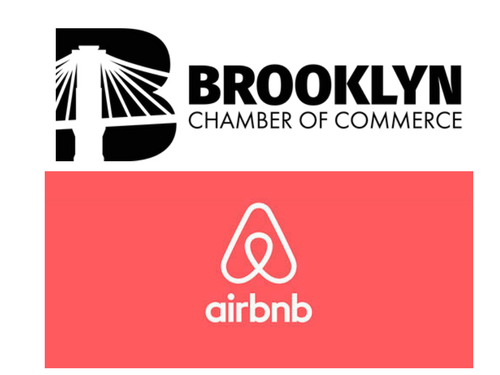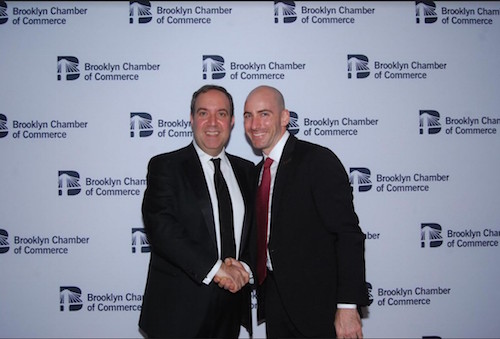Empowering recovering small businesses was a theme of the SOMOS small business panel in sunny San Juan Thursday.
The annual political event brings New York’s politicos together to advocate for Hispanic social justice and public policy issues in the state government.
New York City’s small businesses face an uphill battle in the wake of the pandemic. Randy Peers, president and CEO of the Brooklyn Chamber of Commerce, said mom-and-pop shops are facing an uphill battle caused by a triad of problems: rent arrears; a “soft labor market,” particularly in the fields of hospitality and early education; and supply chain issues.
The rent moratorium ended in January of this year, and the chamber estimates that a third of small businesses are still in arrears. Another survey from July, estimated that as many as 41 percent of small businesses in New York were struggling to pay their rent in full or on time. But, the picture painted by panelists wasn’t bleak.
The panel included Carlos Cortés of Chocobar Cortés; Lisa Sorin, President of the New Bronx Chamber of Commerce; Thomas J. Grech, President and CEO of the Queens Chamber of Commerce; Linda Baran, President and CEO of the Staten Island Chamber of Commerce; and Marlene Cintron, who oversees SBA programs as President of The Bronx Overall Economic Development Corp. BOEDC).
The digital divide was a recurring topic at the event. Peers said the Chambers are — among many programs – working with businesses to bring them into the next era through the “Small Business Technical Assistance” program. The program has helped more than 800 small businesses with everything from building and developing a site to search engine optimization (SEO). They also help businesses get point-of-sale devices. Lisa Sorin, President of the New Bronx Chamber of Commerce, noted the Bronx has one of the largest digital divides in the nation.
But capital still is needed. Marlene Cintron said: “Through SBA, we in the last two years provided PPE and Shuttered Venue Operators Grants. We also had the restaurant revitalization program and we emphasized minorities to be at the head of the line – and then we got sued.” But she said the $300 million that is left will be distributed to the people who were already in line, and who had been approved, until the money runs out. Most of the funds were Economic Injury Disaster Loans (EIDL).
Linda Baran of the Staten Island Chamber said, “The feedback we get is crucial. We have relationships with all the banking managers in all the boroughs; we really, truly, have connections in our communities.” She said relationships with the private sector can also yield funding opportunities.
Michael Garner, Chief Diversity Officer of the MTA, and Bronx Borough President Vanessa Gibson were among the many movers and shakers in attendance.
Garner, although not on the panel, joined the conversation briefly.
“I’m here to say that we are open for business,” he said. “We paid $1.5 billion to certified MWBE firms. We are dealing with the disparity within the disparity.”
He urged the audience to support the MTA in its upcoming fight for funding in Albany and Washington, where the MTA receives only 15% of federal funding, despite being the largest public transit system in the nation.
“We will come to each chamber and host MWBE sessions,” Garner told small-business owners listening in.
Carlos Cortés of Chocobar Cortés, which operates in the South Bronx, Old San Juan and Condado, said his chocolaterie helps businesses from Puerto Rico come to New York. “That’s why we’re here today, to help Puerto Rico,” he said. “So many Puerto Ricans make up the fabric of New York. It’s the cultural, gastronomic center of the world.”
And in solidarity with the Puerto Rican and Latinx communities, Peers said, “We knew we had to make a special effort to reach out to the Latino community,” regarding recovery efforts during the pandemic.”
Overcoming bureaucracy was a struggle faced by at least one human-capital consultant in the audience. Moderator Jonathan L. Bing of Greenberg Traurig spoke about the many technicalities faced by small-business owners. “You even need a specific license to serve frozen desserts,” he said.
But Cintron of the BOEDC said SBA is working hard to ensure a comeback.
“If they’re not overburdened we’re willing to loan them more money,” Cintron said of mom-and-pop shops. “I’ve been approaching [all the] chambers.”
The consensus was that small business owners should stay tuned and reach out to their chambers for more opportunities.
The good news for Brooklyn is that the borough is leading the City’s economic recovery, according to reports by the state Comptroller released in May. The report found Brooklyn beat both the city average and other boroughs by double digits when it came to employment growth and wages.









